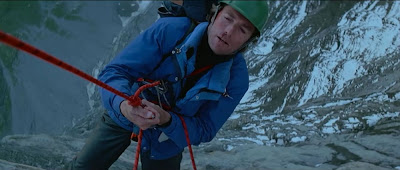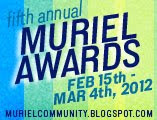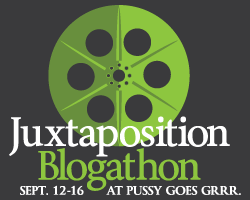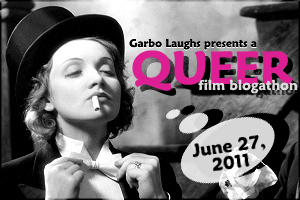There's a short conversation in Silver Linings Playbook (2012, directed by David O. Russel) when its protagonist, Pat Solitano (Bradley Cooper) meets Tiffany Miller (Jennifer Lawrence) in which they compare notes on their various experiences with medication. Both of these characters share a history of mental illness. I think this is the scene that really won me over to the movie, because in most "meet-cute" scenes in romantic comedies, you don't get truth. Here, you get truth naked for both characters to see. It struck a chord in me because whenever I meet other people with similar histories to my own history, you can be sure that the conversation will eventually turn to the minutiae of the medications we've taken: dosages, delivery methods, effects, drawbacks. The shock of recognition is powerful. The difference between a run of the mill romantic comedy and a really great romantic comedy is in the details and if you can make the lovers in such a movie real to me--as this film does--then you've gone a long way toward taking me willingly on whatever emotional journey you like.
Friday, December 28, 2012
You've Got the Silver...
Posted by
Vulnavia Morbius
at
9:50 AM
1 comments
![]()
Labels: 2012, Silver Linings Playbook
Monday, December 24, 2012
All The World's a Stage
Joe Wright's version of Anna Karenina (2012), the umpteenth version of that story, reunites Wright with his muse, Kiera Knightley. It's one of several pedigreed literary adaptations littering this year's awards season (others include Andrea Arnold's Wuthering Heights and Tom Hooper's Les Miserables), and like those films, this one attempts to breathe new life into the story with bold formal experiments. This is a film for which the word "stagebound" is not a pejorative so much as it's a blank description of what one sees on screen. Wright and his screenwriter, Tom Stoppard, have imagined Anna Karenina as a deranged stage production in which the theater serves as the world. It's a bold choice. It creates unexpected visual textures and unusual scene transitions. Whether or not this is the story for which this approach is appropriate is something that can be debated.
Posted by
Vulnavia Morbius
at
12:22 PM
3
comments
![]()
Labels: 2012, Anna Karenina
Thursday, December 20, 2012
I'm Packin' My Bags for the Misty Mountains...
After I got home from seeing The Hobbit: An Unexpected Journey (2012, directed by Peter Jackson), I dug out my copy of The Hobbit to see how many pages of the book the movie actually represented. My copy, an old paperback from the 1970s, ends the "Out of the Frying Pan and Into the Fire" chapter on page 114. This is where the movie ends. The movie is 160 minutes long. There's an axiom in screenwriting that says one page equals one minute, so there's obviously more material on screen than is provided by the book. Critics of director Jackson's brand of "more is more" cinema will almost certainly view this as another example of how Jackson's movies tend toward bloat, and they wouldn't be wrong, exactly. An efficient movie adds more information to the screen to advance the plot or theme from shot to shot. Jackson sometimes adds material to show off his technology or his exuberance as a filmmaker. The result with this particular film and the two that will follow it is, perhaps, the first cinematic literary adaptation that takes longer to watch than it does to read.
But maybe I'm being unfair. In truth, I didn't notice that the film was bloated while I was watching it. In the moment, scene to scene, I was grooving on what I was seeing. In Jackson's defense, he's not just taking material from The Hobbit. He's also folded a lot of the back story of Middle Earth into The Hobbit, drawing from the appendices in The Return of the King and scattered material from The Silmarillion and Unfinished Tales (particularly "The Quest for Erebor"). Most of it makes sense. Most of it is fused into the story more or less seamlessly. Jackson isn't inventing anything that isn't canonical from the books, even though it sometimes feels like it. Jackson and his partners have pored over the minutiae of Middle Earth and gleaned everything they can find that might make for a cool set piece or for heightened drama. What Jackson sees in Tolkien is a vast playground and he apparently wants to try out every swing and seesaw. I don't blame him, really. I grew up with Tolkien and were I in Jackson's position, I might do the same.
Posted by
Vulnavia Morbius
at
7:27 AM
2
comments
![]()
Labels: 2012, J.R.R. Tolkien, The Hobbit, The Hobbit: An Unexpected Journey
Friday, December 14, 2012
Sibling Rivalry
For the first two acts of Lynn Shelton's Your Sister's Sister (2012-ish), I was getting kind of impatient with it. Is this film going to show me anything that wasn't in the trailer? I wondered. This is a plague upon a blighted cinematic landscape: trailers want to make sure that the film is a known quantity, a safe quantity, in order to part you with your hard earned scratch, which means by the time you actually sit in the theater, you've seen the movie already. The rest is make-work. This is not Your Sister's Sister's fault. It is, rather, a fault with the economies of movie making. It turns out that there IS something in the first two acts of Your Sister's Sister that isn't in the trailer, and it's something that provides a key to a final act that managed to be a pleasant surprise. (Note, here there be spoilers).
Posted by
Vulnavia Morbius
at
10:39 AM
0
comments
![]()
Labels: 2011, 2012, films by women, GLBT Cinema, Your Sister's Sister
Saturday, December 08, 2012
Mountains Out of Molehills
My partner and I have a recurring joke. Sometimes, when I'm in our living room watching a movie, she'll randomly chime in from somewhere else in the house: "So do you like Steel Magnolias yet?" "No," I'll answer. "The estrogen isn't working," she'll snipe. Hilarious, eh? Here's the thing about switching genders: it doesn't really change one's tastes a whole lot. If you like dumb action films before transitioning, you'll probably still like them afterward. You won't magically start liking chick flicks if you didn't like them to start unless you're hellbent on really "performing" your gender. I still watch a ridiculous number of horror films, after all. I had this go-around with my therapist once. She recommended that I start reading certain types of books to "socialize" me. I was kind of resistant to this idea because the first book she recommended was horrible. I didn't even bother with a second. My preferred beach reading is still hard boiled crime novels.
But that's not to say that there's not an influence. There is, and it's subtle.
One of the bitterly funny things about joining an oppressed minority is that things that didn't bother you before really start to bother you after, whether it's because you shed the blinders of privilege or you feel the pinch of overt aggressions from the dominant culture. It's a hard pill to swallow, sometimes. I didn't grow up as a queer feminist. I was a middle class white kid who barely knew what feminism even was. My awakening came once I discovered to my sorrow that all of that stuff you hear feminists complaining about is very, very real and applied to me directly. I'm not proud of this, but late to the party is better than not showing up at all.
I got to thinking about all of this while watching Clint Eastwood's 1975 mountain climbing thriller, The Eiger Sanction, which, to be charitable, is not among Eastwood's more laudable films. It's a horrible brew of racism, sexism, heterosexism, and ableism, all packaged together in a way that would likely have resonated with a Men's Rights movement, had such a thing existed in 1975. Have you ever visited a comment thread when the topic was feminism? This film seems to have the same spirit of lashing out against the encroaching matriarchy feminism is obviously seeking to foist upon poor, put-upon, disenfranchised menfolk. But I'll get to all of this.
Posted by
Vulnavia Morbius
at
7:14 AM
4
comments
![]()
Labels: annoying personal anecdotes, Clint Eastwood, feminism, The Eiger Sanction
Monday, December 03, 2012
The Worse Demons of Our Natures
I knew going into it that Abraham Lincoln, Vampire Hunter (2012, directed by Timur Bekmambetov) was going to hurt my head. How could it not? With a title and high concept that ridiculous? A few years ago, some people made a movie called Jesus Christ, Vampire Hunter, so this isn't even a novel idea. I thought that movie sucked, so I expected the pain from this one. I underestimated it.
Posted by
Vulnavia Morbius
at
7:06 AM
4
comments
![]()
Labels: 2012, Abraham Lincoln Vampire Hunter




















